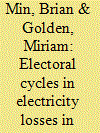| Srl | Item |
| 1 |
ID:
127291


|
|
|
|
|
| Publication |
2014.
|
| Summary/Abstract |
A third of electricity in India is lost each year, where losses refer to power that is supplied but not billed. Utilizing data from the power corporation of Uttar Pradesh, India's most populous state, we study the politics of electricity losses. Examining annual data over four decades, we document that UP's electricity losses tend to increase in periods immediately prior to state assembly elections. Drawing upon geographically disaggregated data for the period 2000-09, we observe higher line losses just prior to the 2002 and 2007 state elections. Our analysis shows that the incumbent party was more likely to retain the assembly seat as line losses in the locality increased. We interpret these results as corroboration that political parties deliberately redirect electricity to flat rate and unbilled users in a context of chronically inadequate supply. Political factors appear to affect line losses in ways that technical and economic factors alone cannot explain.
|
|
|
|
|
|
|
|
|
|
|
|
|
|
|
|
| 2 |
ID:
094091


|
|
|
|
|
| Publication |
2010.
|
| Summary/Abstract |
Much of the quantitative literature on civil wars and ethnic conflict ignores the role of the state or treats it as a mere arena for political competition among ethnic groups. other studies analyze how the state grants or withholds minority rights and faces ethnic protest and rebellion accordingly, while largely overlooking the ethnic power configurations at the state's center. drawing on a new data set on ethnic power relations (EPR) that identifies all politically relevant ethnic groups and their access to central state power around the world from 1946 through 2005, the authors analyze outbreaks of armed conflict as the result of competing ethnonationalist claims to state power. the findings indicate that representatives of ethnic groups are more likely to initiate conflict with the government (1) the more excluded from state power they are, especially if they have recently lost power, (2) the higher their mobilizational capacity, and (3) the more they have experienced conflict in the past.
|
|
|
|
|
|
|
|
|
|
|
|
|
|
|
|